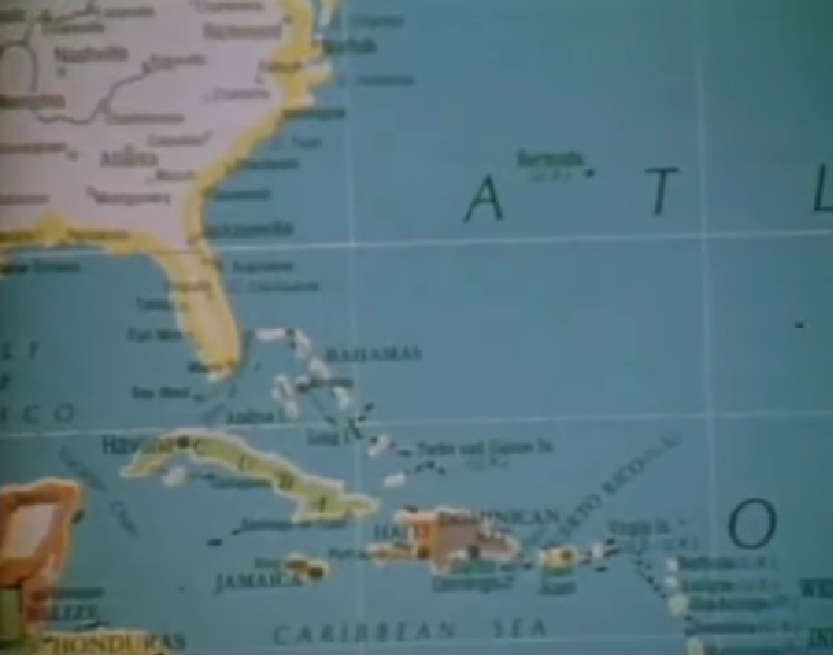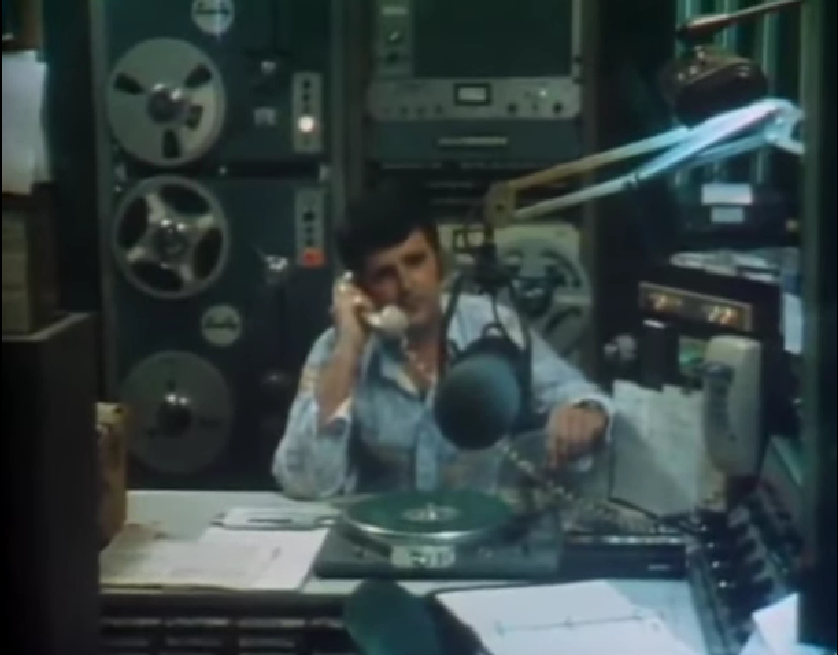
I gotta say, of all the staples of Mysterious Phenomena programming, the Bermuda Triangle was one of the topics that I was never particularly interested in. Maybe it was just the vagueness of it, encompassing a broad bunch of stories with only watery connections between them—the tales of sea and air vessels disappearing just didn’t have much to hook me, and when theories start coming in, they’re either directly tied to other topics that are more interesting elsewhere (Aliens! Atlantis!) or kinda dull (Magnets!) The Bermuda Triangle is a mystery that lacks a face—or a consistent placement on the map—and feels more like a classical mariner’s legend that started getting passed around by landlocked weirdos trying to turn everything into another Stonehenge for them to project onto. Even so, it’s one of the most well-known of these mysteries, which meant that I ended up absorbing plenty of information about it when it was wedged in between the Cryptids and UFO stories I actually cared about.
The In Search Of… episode on the topic is the fourth one of its original run, which just goes to show how big the Bermuda Triangle mystery was. The stories presented here did not sway my opinion that the whole thing is vague to the point of being uninteresting, and in an unusual move, they don’t really delve into any of the wackier theories that might liven up the talking heads. There might be a specific reason for this: this episode has an agenda, and they’re putting on their best, least sensationalist face in order to further it. Which is not to say that there is nothing silly here—they just can’t help themselves! But it’s even funnier in this context because they’re trying to make a serious argument, but end up doing themselves few favours.

Season 1, Episode 4 (April 27th, 1977)
THE BASICS:
This could have just been a normal episode about a well-trodden topic—but no, someone working at In Search Of… decided that they had to pick a fight with another TV show. When Leonard Nimoy makes his first on-screen appearance, he talks about how genuine attempts to determine what’s going on in the Bermuda Triangle have been “abandoned by some experts who claim there is no mystery.” He then goes on to lambaste a “television program underwritten in part by a national science foundation” for dismissing the possibility that there’s anything going on in the area worth investigating. In all likelihood, the program he’s talking about is the PBS series Nova (or its BBC counterpart Horizon), which aired an episode about the Bermuda Triangle in June 1976, just under a year before. So, by the fourth episode of this Mysterious Phenomena program—which by this point, had already aired a segment where a man hooked yogurt up to a Polygraph test—is already calling out a legitimate science program. I’m sure this will go well for them!

The upfront argument Nimoy presents to us against the dismissive tone of the-program-that-may-or-may-not–be-Nova is, maybe not surprisingly, more of an appeal to emotions. Hesays that “the only possibilities not taken into consideration [by the program] are the personal stories of individuals who have been involved in strange occurrences”—basically, trying to make them feel bad about being so snooty and elitist and Establishment by disbelieving the people who tell the stories. This is not an unfamiliar tactic in In Search Of… or any similar programs, which generally take the tact that anything with this many anecdotes must therefore be a real thing to some extent—even if those anecdotes are hazy or even contradictory. Why would these people lie? He goes on to say that “somewhere in these stories, the clues may exist that will open the way to the final solution of the Bermuda Triangle mystery”, and maybe they should have thought of some other term to use other than “final solution.” Just a thought.

Although they present a montage of famous disappearances in the Bermuda Triangle partway through the episode—the USS Proteus in 1941, the SS Marine Sulphur Queen in 1963, and the 1945 double vanishing of the Flight 19 bombers AND the party that went looking for them—most of it taken up by interviews with people who have had some sort of experience in the Bermuda Triangle, or in one case we’ll get to in good time, an extremely tangential connection. The first interviewee is a Coast Guard lieutenant, who Nimoy’s narration emphasizes has had a “long and distinguished career” (an earlier part of the episode also describes how annoying it is working for the Coast Guard), who tells us about the time his boat detected a solid line on its radar that led them to what he describes as a “gray wall”, which was coupled with the onset of breathing problems and trouble in the engine room. It is stated very emphatically that this event had happened only once in his life, despite him spending ample time in the area, and he evidently hadn’t heard of anyone else encountering it either—mysterious, yes, but it’s also one of those things that is unverifiable and is not even that similar to other accounts. That he actually got out to tell people about it also makes his story very different from most of the famous Bermuda Triangle cases.
The second story tackles an air-based event in the Triangle, in which a plane owned (by not piloted) by the interviewee mysterious disappeared and then was found with one of its wing sheared clear off—he says that the investigators of the crash site told him that it was “unbelievable that such a force could exist” that would be able to cause that particular kind of damage. Again, certainly mysterious, but again, a singular event that is only part of an extremely generalized pattern. Nimoy’s narration tells us that these events are the “consequences of a force that somehow exists” (“somehow” might be my favourite word in these shows), but at no point are we given an idea of what the force is, and the examples have very little in common other than the area they took place in. Even more confusingly, the narration repeats that both the interviewees have flown/sailed in the Bermuda Triangle many, many times without incident, positing the stories they tell are freak accidents, which does not necessarily help the argument that there is a singular phenomenon causing them.

So despite imploring that there is something worth investigating, the show does not actually present any specific ideas of what is causing the strange disappearances and technological breakdowns in the Bermuda Triangle. The loss of radar and radio is the only recurring element in these stories—as demonstrated by an interviewee who was an air traffic controller involved in the Flight 19 investigation and later had his own problems while flying over the Triangle—but that’s pretty much the only other commonality. That veteran pilot’s own theory is that whatever it is is emanating from the ocean floor and extends only to “lower altitudes”, but it still doesn’t explain what it is and why it seemingly has so many different manifestations.

That’s the problem with this episode’s pleas for science to take the Bermuda Triangle stuff seriously. Nimoy says, “In light of the testimony of of four individuals, it seems far-fetched to presume that the Bermuda Triangle mystery has been solved”; and yes, they have stories from “credible witnesses” (which is why the narration emphasizes their experience and positions so much), but the things they describe provide little to actually investigate. What would researchers be looking for in the area? The show doesn’t know, and the interviewees who actually experienced it don’t seem to know either. Hearing them talk about it, one might surmise that, at best, there isn’t one mystery here, but several different ones that may not be connected at all. But even though their argument is no more convincing here than in any other episode, they still feel that they can smugly proclaim that “To say in essence that science need not investigate is to destroy the rationale for any scientific quest”, once again trying to shame serious scientific inquiry into attempting to make sense of something with no consistency. The writers of In Search Of… are trying to look like the reasonable ones, but they provide little of substance to back that up.

MOST RIDICULOUS CLAIM(S):
In between actual eyewitness encounters, the show veers off into kookville with a recounting of an incident during a Bermuda Triangle-focused radio program on a Fort Lauderdale station, hosted by an “amateur researcher” (the narration does not necessarily give that title the same weight as the other interview subjects.) At one point during the show, the phone lines seemed to stop working, and the one caller who gets through to the host started babbling on about, well, the kinds you’d expect a random caller to babble on about during a Bermuda Triangle-themed radio show (Nimoy calls it, “a call that is hard to conceive as anything other than gibberish…and yet…”) In a vaguely sinister Hannibal Lecter tone, the caller says “There is one of you on the program who will understand what I’m going to say…every living thing on this planet has an aura…the area you are discussing now is the aura of this planet…it is the communicative channel through which the Million[?] Council governs this planet.” He goes on to explain that anyone who enters the area while the communication channel is open “do not disappear, but they are in the timeless void. All perfectly alive and well.” Listeners to the radio show later describe having a “physical or mental reaction” to the call, “an emotionally unsettling experience.” Nimoy tells us that “There is no way to certify the authenticity of the call”, but I ask—certify what?
None of this is particularly weird. There’s a long history of people calling in (or sometimes hacking in) with strange messages mashing up every New Age/paranormal cliche, as this one does (I haven’t even watched the In Search Of… episode specifically about auras.) Even the charged reaction is not surprising—if you’re not expecting to hear something like that out of the blue on a late night radio show, it can be quite unsettling (especially if you’re on…certain substances at the time.) At the same time, this radio call-in weirdo is the closest thing this episode gets to having someone present an “explanation” for the Bermuda Triangle, even if it’s a goofy nonsense one—and that they spent the rest of the episode trying not to veer off into wild speculation territory makes this segment stick out like a sore thumb.

WHAT WE HAVE FIGURED OUT SINCE THEN:
In a sense, there have been further investigations into the Bermuda Triangle, just like this show wanted. Unfortunately for them, most of those investigations not only reveal that most of the disappearances have plausible explanations (such as poor ship construction), but that statistically, there is no greater preponderance of mysterious happenings in the Bermuda Triangle area than there are in any other stretch of water. The Triangle can’t even make it on to a list of most dangerous waters for shipping these days. As the years go by, the Bermuda Triangle has only become even less interesting, proving my initial reactions to be entirely justified.